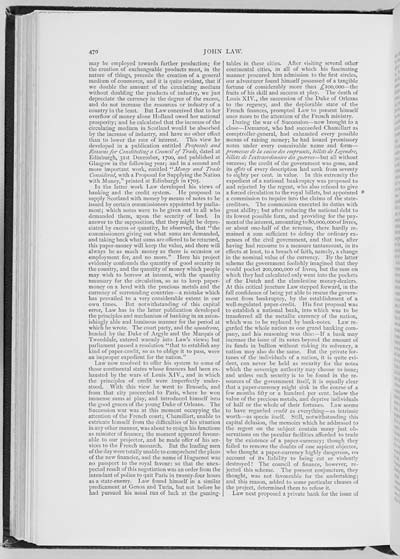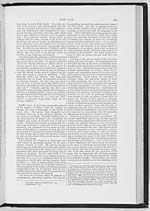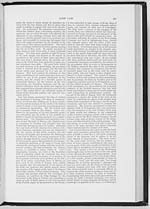470
may be employed towards further production; for
the creation of exchangeable products must, in the
nature of things, precede the creation of a general
medium of commerce, and it is quite evident, that if
we double the amount of the circulating medium
without doubling the products of industry, we just
depreciate the currency in the degree of the excess,
and do not increase the resources or industry of a
country in the least. But Law conceived that to her
overflow of money alone Holland owed her national
prosperity; and he calculated that the increase of the
circulating medium in Scotland would be absorbed
by the increase of industry, and have no other effect
than to lower the rate of interest. This view he
developed in a publication entitled Proposals and
Reasons for Constituting a Council of Trade, dated at
Edinburgh, 31st December, 1700, and published at
Glasgow in the following year; and in a second and
more important work, entitled "Money and Trade
Considered, with a Proposal for Supplying the Nation
with Money," printed at Edinburgh in 1705.
In the latter work Law developed his views of
banking and the credit system. He proposed to
supply Scotland with money by means of notes to be
issued by certain commissioners appointed by parlia-
ment; which notes were to be given out to all who
demanded them, upon the security of land. In
answer to the supposition, that they might be depre-
ciated by excess or quantity, he observed, that "the
commissioners giving out what sums are demanded,
and taking back what sums are offered to be returned,
this paper-money will keep the value, and there will
always be as much money as there is occasion or
employment for, and no more." Here his project
evidently confounds the quantity of good security in
the country, and the quantity of money which people
may wish to borrow at interest, with the quantity
necessary for the circulation, so as to keep paper-
money on a level with the precious metals and the
currency of surrounding countries�a mistake which
has prevailed to a very considerable extent in our
own times. But notwithstanding of this capital
error, Law has in the latter publication developed
the principles and mechanism of banking in an aston-
ishingly able and luminous manner for the period at
which he wrote. The court party, and the squadrone,
headed by the Duke of Argyle and the Marquis of
Tweeddale, entered warmly into Law's views; but
parliament passed a resolution "that to establish any
kind of paper-credit, so as to oblige it to pass, were
an improper expedient for the nation."
Law now resolved to offer his system to some of
those continental states whose finances had been ex-
hausted by the wars of Louis XIV., and in which
the principles of credit were imperfectly under-
stood. With this view he went to Brussels, and
from that city proceeded to Paris, where he won
immense sums at play, and introduced himself into
the good graces of the young Duke of Orleans. The
Succession war was at this moment occupying the
attention of the French court; Chamillart, unable to
extricate himself from the difficulties of his situation
in any other manner, was about to resign his functions
as minister of finance; the moment appeared favour-
able to our projector, and he made offer of his ser-
vices to the French monarch. But the leading men
of the day were totally unable to comprehend the plans
of the new financier, and the name of Huguenot was
no passport to the royal favour: so that the unex-
pected result of this negotiation was an order from the
intendant of police to quit Paris in twenty-four hours
as a state-enemy. Law found himself in a similar
predicament at Genoa and Turin, but not before he
had pursued his usual run of luck at the gaming-
tables in these cities. After visiting several other
continental cities, in all of which his fascinating
manner procured him admission to the first circles,
our adventurer found himself possessed of a tangible
fortune of considerably more than 7100,000�the
fruits of his skill and success at play. The death of
Louis XIV., the succession of the Duke of Orleans
to the regency, and the deplorable state of the
French finances, prompted Law to present himself
once more to the attention of the French ministry.
During the war of Succession�now brought to a
close�Demarest, who had succeeded Chamillart as
comptroller-general, had exhausted every possible
means of raising money; he had issued promissory
notes under every conceivable name and form�
promesses de la caisse des emprunts, billets de Legendre,
billets de l' extraordinaire des guerres�but all without
success; the credit of the government was gone, and
its effets of every description had sunk from seventy
to eighty per cent, in value. In this extremity the
expedient of a national bankruptcy was proposed to
and rejected by the regent, who also refused to give
a forced circulation to the royal billets, but appointed
a commission to inquire into the claims of the state-
creditors. The commission executed its duties with
great ability; but after reducing the national debt to
its lowest possible form, and providing for the pay-
ment of the interest, amounting to 80,000,000 of livres,
or about one-half of the revenue, there hardly re-
mained a sum sufficient to defray the ordinary ex-
penses of the civil government, and that too, after
having had recourse to a measure tantamount, in its
effects at least, to a breach of faith, namely, a change
in the nominal value of the currency. By the latter
scheme the government foolishly imagined that they
would pocket 200,000,000 of livres, but the sum on
which they had calculated only went into the pockets
of the Dutch and the clandestine money-dealers.
At this critical juncture Law stepped forward, in the
full confidence of being yet able to rescue the govern-
ment from bankruptcy, by the establishment of a
well-regulated paper-credit. His first proposal was
to establish a national bank, into which was to be
transferred all the metallic currency of the nation,
which was to be replaced by bank-notes. Law re-
garded the whole nation as one grand banking com-
pany, and his reasoning was this:�If a bank may
increase the issue of its notes beyond the amount of
its funds in bullion without risking its solvency, a
nation may also do the same. But the private for-
tunes of the individuals of a nation, it is quite evi-
dent, can never be held as security for the notes
which the sovereign authority may choose to issue;
and unless such security is to be found in the re-
sources of the government itself, it is equally clear
that a paper-currency might sink in the course of a
few months fifty or a hundred per cent, below the
value of the precious metals, and deprive individuals
of half or the whole of their fortunes. Law seems
to have regarded credit as everything�as intrinsic
worth�as specie itself. Still, notwithstanding this
capital delusion, the memoirs which he addressed to
the regent on the subject contain many just ob-
servations on the peculiar facilities afforded to trade
by the existence of a paper-currency; though they
failed to remove the doubts of one sapient objector,
who thought a paper-currency highly dangerous, on
account of its liability to being cut or violently
destroyed! The council of finance, however, re-
jected this scheme. The present conjuncture, they
thought, was not favourable for the undertaking;
and this reason, added to some particular clauses of
the project, determined them to refuse it.
Law next proposed a private bank for the issue of

![]() Universal Viewer |
Universal Viewer | ![]() Mirador |
Large image | Transcription
Mirador |
Large image | Transcription
![]()

